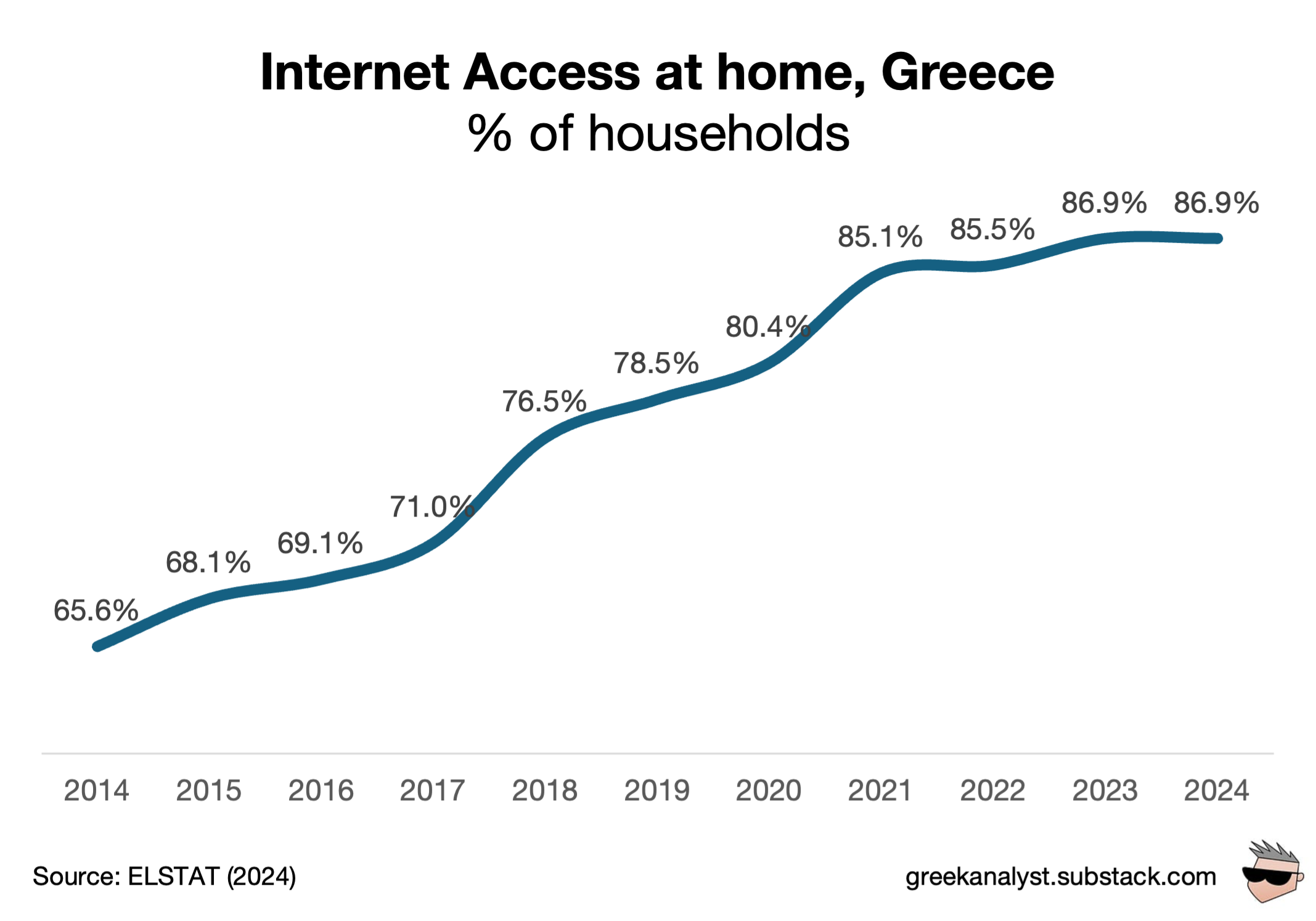PP 2 - Digital Access
GREECE
Digital access is crucial in the modern world. The internet has transformed how people live, learn, and communicate across the globe. According to DataReportal, more than five billion people are online today. However, this access is not evenly distributed. A range of issues — such as geography, economic inequality, and outdated infrastructure — continue to limit internet access in many parts of the world.
Greece is a southeastern European country known for its rich history and stunning geography, including thousands of islands scattered across the Aegean and Ionian seas. As of 2023, Greece has a population of approximately 10.3 million people (CIA World Factbook). Its capital, Athens, is home to over 3 million residents and remains a cultural and political hub. Greece is a parliamentary republic and a member of the European Union. Since the early 2000s, Greece has taken steps to improve digital access for its citizens.

Greece’s digital infrastructure is regulated by the Hellenic Telecommunications and Post Commission (EETT). The commission oversees the telecommunications sector, ensuring competition and quality in services like internet, television, and radio. Over the last decade, Greece has rolled out several digital modernization projects, many of them co-funded by the European Union. For instance, the Ultrafast Broadband (UFBB) project aims to bring high-speed internet to underserved areas by installing fiber-optic networks across the country. This project is expected to provide speeds of up to 100 Mbps to rural and semi-urban areas.
According to the Greek Ministry of Digital Governance, the government also launched “Digital Greece 2020” and “Digital Transformation Bible 2020–2025”, plans aimed at bridging the digital divide and bringing more public services online. Despite these efforts, many citizens continue to face barriers to digital access, particularly in rural or mountainous regions and among older populations.
Greece, a democracy with a vibrant history of public discourse, has faced growing criticism in recent years over its record on press freedom. According to Reporters Without Borders, Greece ranked 107 out of 180 countries in the 2023 World Press Freedom Index — one of the lowest in the European Union. This is a sharp decline compared to previous years and reflects growing concerns over government surveillance, harassment of journalists, and media concentration.
The administration of Prime Minister Kyriakos Mitsotakis, elected in 2019, has been criticized for increasing government control over public media outlets. Independent journalists have reported being followed, threatened, or pressured to alter critical reporting. The assassination of veteran crime reporter Giorgos Karaivaz in 2021 shocked the country and highlighted the dangers journalists face in investigating corruption and organized crime.
In addition, the Greek government has been accused of misusing spyware, such as Predator, to surveil politicians and reporters. Though the government denies any direct involvement, a parliamentary investigation is ongoing. These developments have cast a shadow over Greece’s commitment to democratic values and free expression. Greece has made significant strides in improving internet accessibility. According to the Inclusive Internet Index, around 82% of households in Greece now have internet access — a major jump from the early 2000s when internet usage was under 10%. Urban areas such as Athens and Thessaloniki have strong internet penetration, while rural and island regions lag behind.
Rural access is a growing concern. While 86% of urban households report having access to fixed broadband, only 69% of rural households do. Greece’s geography — with its many islands and mountainous terrain — has made it especially difficult and expensive to build consistent, high-speed infrastructure in every region. A report by the Hellenic Statistical Authority (ELSTAT) showed that in 2022, only 58% of people aged 65 or older had used the internet in the last three months. Age and income levels are two of the biggest factors influencing internet usage in Greece.
Greek families with multiple children often had to share a single device or weak internet connection. Many relied on mobile data plans, which are limited and can be costly, especially for low-income households. Even in 2023, some households in remote villages still rely on outdated DSL connections with speeds below 10 Mbps. Affordability is another key barrier. According to Freedom House, the average monthly cost of broadband in Greece is about €30–40, or $33–$44, depending on the provider and plan. While this may seem reasonable, it can be burdensome for families living below the poverty line or for unemployed citizens — especially in a country still recovering from the economic crisis of the 2010s.
Even among connected households, internet speed is not always adequate. A 2023 Speedtest Global Index ranked Greece 90th in the world for fixed broadband speed, with average download speeds around 45 Mbps, significantly lower than in other EU countries. Comparatively, the U.S. average speed exceeds 200 Mbps.
When asked why they do not use the internet, many Greeks cite reasons such as lack of digital skills, low interest, security concerns, or that it is “not necessary” for their daily lives. Digital literacy programs exist but are often underfunded or limited to major cities.Smartphones are becoming the main way Greeks access the internet. According to ELSTAT, over 90% of internet users access the web via mobile phones. However, the cost of smartphones and mobile data can still limit accessibility for some. In Greece, the cheapest smartphone costs about 10–12% of a person’s monthly income — a burden for pensioners and those earning minimum wage. Mobile data in Greece is also among the most expensive in Europe, according to the OECD, making it difficult for many to rely on mobile networks as their primary internet connection. While many telecom companies offer bundled services, these are often unaffordable or unavailable in isolated regions.
This was written with the help of AI.



Comments
Post a Comment